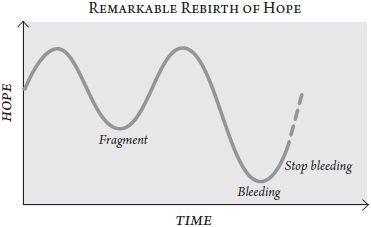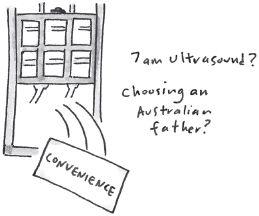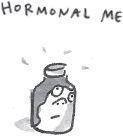One Good Egg: An Illustrated Memoir (22 page)
Read One Good Egg: An Illustrated Memoir Online
Authors: Suzy Becker
“Mmm. Are you afraid?”
“No.” I got myself one last glass of water and we worked on the crossword puzzle until we turned out the lights.
There wasn’t much incentive to get out of bed the next morning. No coffee, no breakfast, nowhere to be until ten. “C’mon,” Lorene prodded me, “it’s trash day.” I rolled out of bed, did the trash, showered, and went up to my office to collect a few things I could do while I was resting post-retrieval.
Dr. Rankin (the gynecologist’s referral we’d dissed) was our surgeon. The nurse described him as more “laid-back” than Dr. Penzias. Dr. Penzias had never struck us as uptight, but we weren’t nurses. Dr. Rankin was very kind, not the least bit disapproving, but Lorene never passed up an opportunity to make an extra-good impression. She complimented his accent, which he revealed was Scottish.
The anesthesiologist arrived and Lorene kissed me good-bye, gave my wedding ring-less hand a last squeeze, and went off to the waiting room. The next thing I remember, I was being transferred to the post-op area. Lorene came in about the same time as the saltines and ginger ale. We were free to go, or to stay as long as we liked. The lab would call us with the official egg count in the afternoon.
Egg Retrieval
The doctor uses a vaginal ultrasound to guide a hollow needle to the ovaries. The needle punctures the follicle and the egg and fluid are suctioned out.
The count was twenty. (The average count is ten to twelve.) I called to brag to my IVF-vet friend. She was unimpressed. (She was also alone with her twins, without child care for the week.)
“The egg count is unreliable,” she said. “What really matters is how many fertilize.”
She was always one step ahead. Lorene’s and my sanity-preservation plan required us to celebrate the step we were on. I stayed in bed, did a little work. I felt fine, felt like I was slacking, in fact, since I felt no pain, just my normal afternoon drowsiness. I closed my eyes for a second and woke up two hours later when the phone rang.
“Suzy, it’s Margaret” (the neighbor from across the street), “Do you have any eggs?”
Do I have any eggs? Do
I
have any eggs? Well, Margaret, let me tell you. I have TWENTY! TWENTY EGGS!
“I just need one.”
She was at the door a few minutes later. I handed her the lone egg, recognizing, after the fact, that my bedhead conveyed a certain not-exactly-working-from-home ethic.
Fourteen of my twenty eggs fertilized. I called my IVF friend. She was not impressed. “What really matters is how many good embryos you get.”
We got two “beautiful eight-cell embryos” and one six-cell embryo which we agreed to freeze.

The transfer doctor’s resemblance to Al Franken stuck with me, whereas his last name, something one-syllable, did not. He put the two beautiful embryos back into my uterus (while I was off in general-anesthesia land), and we were back on the road an hour later. Dr. Franken called around noon to report that my six-cell embryo never made it into the freezer; it had started to fragment.
So much for my two beauties.
I couldn’t refrain from asking, while trying to head off a nonanswer, “I know you may not know, and your answer won’t change anything, I’ll still have to wait to see whether I get pregnant, and of course, I won’t hold you to it, I’m just asking, really for my, you know, my peace of mind, what’s the likelihood of the transfers fragmenting?”
“As you said. We don’t know.”
The IVF coordinator called in the late afternoon. She was following up: Fourteen out of twenty was a high fertilization rate, very promising. Two embryos out of fourteen fertilized eggs was very low. The results of the stain testing they’d done on the extra eggs and sperm might tell Dr. Penzias something about the egg/sperm quality, which could inform the next cycle.
I interrupted. “So this one’s not going to work out?”
“I’m sorry, I didn’t mean to suggest that. Not at all. You only need one good egg.”

It’s just that that one can be so damn hard to come by.

TIPS TO STAY SANE WHILE WAITING FOR YOUR PREGNANCY TEST RESULTS
1. Once your transfer has taken place, there is nothing you can do to influence the outcome. Pessimism, anxiety, etc. will not influence outcome.
2. Embryos cannot fall out (into a pothole, toilet, etc.).
3. Progesterone will cause confusing symptoms. Only a test will tell if you are pregnant.
It was a rainy spring
. The rain took the pressure off weekend yard work, although some of the pressure wended its way into the weekday evenings. The sounds of our neighbors’ mowers marred the few good sunsets we might have otherwise enjoyed.

L
orene and I had gone to Vermont to celebrate our first anniversary, leaving the yard and house far behind. Sunday morning, the actual day, we went to Dot’s Diner, where we’d had our first “civilly united” breakfast. We brought the
New York Times
back to the house and read all through the afternoon in front of a fire. There were long stretches that weekend when I didn’t care if I was pregnant. We would have a happy, more self-indulgent life together without children.
Then I started to bleed. I cried for a few minutes alone in the bathroom. Lorene looked up when I walked back in. “I’m sorry,” I said. She needed no further explanation. “I really thought
this
time . . . ”
“I know,” she said. She was crying, too.
The rest of the day, the sight of red—cutting cherries, red sock fuzz on the white porcelain bathtub—would turn my stomach. And then the bleeding stopped, and I started having cramps.
“You know,” Lorene said, “spotting and cramps are pregnancy symptoms.” By the time we dined on bread, cheese, baby artichokes, and defrosted wedding cake, I was willing to believe again that I could be pregnant. Spotting and cramping certainly marked a departure from the first seven failed attempts.

T
he sun was out on Tuesday, the morning of the pregnancy test. Lorene was now positive I was pregnant. I had gone so far as to think maybe I might be, too. Getting to take the blood test was, itself, something of a milestone.
An hour and a half after I had been back at work, pretending to have a normal day, my studio phone rang. Lorene appeared on my stairs out of nowhere. It was Boston IVF. It did occur to me in that split second that ten thirty (vs. after lunch or at the end of the day) was an auspicious time for a call, and I wasn’t all wrong.
“Suzy, your pregnancy test was positive,” the nurse said flatly. I gave Lorene the thumbs-up and she gasped. “However, the positive hCG value is low,” which would explain the nurse’s affect. “There is a fifty percent chance of a healthy pregnancy. We’d like you to come back in for another test in two or three days.”
Lorene and I sat on the stairs and I repeated the nurse’s four sentences. Three days was more convenient, but we didn’t want to wait. (And since when was convenience a factor?)

After I scheduled the test, I succumbed to an online hCG-research session while my cartoons, book, Ride FAR, and the library roof grant application waited. Best-case scenario: delayed implantation. Probable-case scenario: miscarriage or ectopic pregnancy.
Human Chorionic Gonadotrophin (hCG)
A hormone produced by the developing placenta post-conception, measurable in blood or urine.
That night, I started to bleed heavily. I would’ve just thought it was my period if I hadn’t had that stupid pregnancy test. We were sorry all over again. Lorene wanted to cancel our dinner plans to stay home and cry. I couldn’t be convinced of the upsides.
THIS has already taken up too much of our emotional energy.
Besides, if I started crying, I might never stop.
